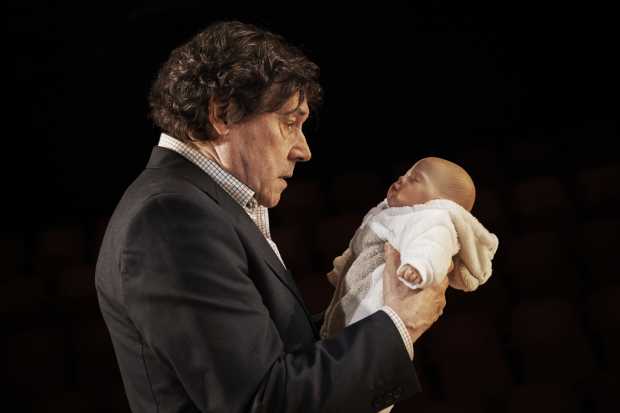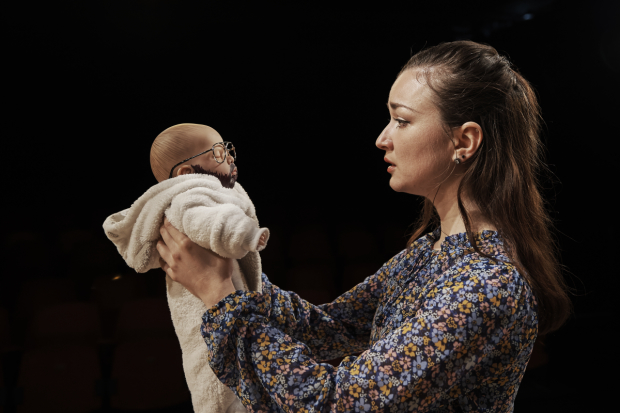Cyprus Avenue Looks Right at Home on Lafayette Street — and It's Terrifying

(© Ros Kavanagh)
It feels like an emotional bait and switch, but David Ireland is never anything less than forthcoming about what Cyprus Avenue is and is going to become. It takes only a few lines of dialogue for the first racial slur to fall from the mouth of our Northern Irish protagonist Eric (Stephen Rea, brilliantly reprising the performance he gave at the Abbey in Dublin and London's Royal Court for the play's New York premiere at the Public Theater). And yet, his shocking prejudices turn into a source of amusement — the Irish equivalent of the crazy Confederate uncle whose conspiracy theories you appease at Thanksgiving dinner but joke about on the drive home. The laughter lulls us into such a sense of complacency that when Ireland lowers the boom, it's as if we could never have seen it coming. But we should have, right?
The setting may be foreign, but no matter what nation, province, or country road you visit, the story of hating "the other" is always the same: Love becomes hate and politics become religion. In this case, the story hinges around the Belfast-born Eric, who, having grown up on Van Morrison's idyllic Cyprus Avenue, clings to his British identity, the main characteristics of which are: not being Irish, not being Catholic, and not being a Republican (the ingredients for a "fenian" as he derogatorily calls them). In a fit of mindfulness, however, Eric suddenly wonders, "What is a Protestant? What does any of it even mean?" What if he, in fact, is Irish — or worse, has been Irish all along? It's a promising revelation, and Rea shows every erratic shift of Eric's unstable gears in a pages-long monologue that follows (a master class in Shakespearean soliloquizing). But as history repeatedly proves, when your entire identity is built on an illusion, sometimes it's easier to lean into the figment than let your delicate worldview come crumbling down.
Never mind if that figment alienates Eric from his entire family. His wife, Bernie (Andrea Irvine), and daughter Julie (Amy Molloy) coo over Julie's infant daughter Mary-May while Eric strengthens his conviction that the baby is — actually — loathsome Republican politician Gerry Adams in disguise (part of Adams's master plan to infiltrate Unionist families). It's certainly on the extreme end of paranoia, but how much more extreme is it than the John Birch Society's theory of a communist conspiracy, or the sex trafficking rumors of Pizzagate? Ireland underlines the absurdity with a Who's On First routine of sorts between Eric and a member of a loyalist paramilitary group named Slim — an unnerving performance by Chris Corrigan, who keeps our hair on end as he walks the line between Lou Costello and Ted Kaczynski. But when stakes are real, clowns plummet from entertaining to terrifying.
The sheer shock of the boundaries that Ireland and director Vicky Featherstone are willing to cross onstage coupled with the jolt of self-reflection, make Cyprus Avenue a play that everyone should see, but one I wouldn't wish my worst enemy to sit through twice. It's one of the most unsettling experiences in a theater you're likely to have, but it's also one of the most cohesive articulations of the cultural civil war in which the world finds itself and the unfathomable cliffs we're speeding toward (if we haven't already driven off the edge).
Featherstone draws such a fine line between comedy and danger that you never quite know how carefully you need to tread at any given moment. You can never even really be sure that the world we're in abides by the rules of reality — designer Lizzie Clachan's sparse, all-white set, populated by only two couches and a carpet suggesting the possibility that all of these scenes are springing from Eric's unhinging mind. The play's most grounding moments come from its framing device: Eric's therapy sessions with a woman named Bridget, played by Ronkẹ Adékoluẹjo as the poised paradigm of reasoned thinking. "Our conditioning. Our cultural background. Inside it's a mess. Every single one of us is a diabolic mess," she tells her new patient. "It's your job to untangle your insides." After sitting through Cyprus Avenue, that task will seem exponentially more urgent and exponentially more futile.

(© Ros Kavanagh)










